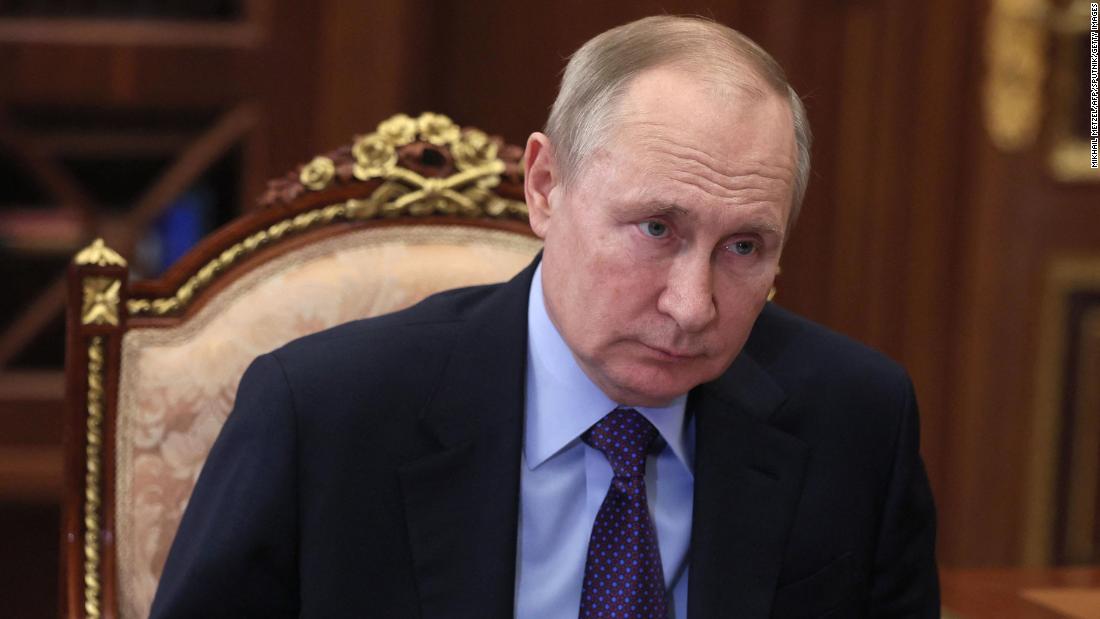Putin poses a deep threat to peace in Europe as the ‘drumbeat of war’ sounds on the Russian-Ukrainian border
He concluded that “our spiritual, human and civilizational ties formed over centuries have their origins in the same sources…the true sovereignty of Ukraine is only possible in partnership with Russia.”
Having already invaded Crimea in 2014, fears of Russian troops crossing the border again have never been higher.
Talks last week — bilateral with the United States in Geneva on Monday, with NATO in Brussels on Wednesday and culminating at the OSCE in Vienna on Thursday — which were aimed at easing tensions, seem to have succeeded on the contrary and entrenched the Putin’s emissaries in rhetorical hostile positions.
Russian Deputy Foreign Minister Sergei Ryabkov set the tone on Monday by demanding “ironclad, watertight, bulletproof and legally binding guarantees, not assurances, not guarantees, guarantees” that NATO denies Ukraine and others membership and reverts to 1997 lines.
Two days later, after the NATO talks in Brussels, another deputy foreign minister, Alexander Grushko, threatened to use force if they didn’t get what they wanted. “We have a set of legal military-technical measures that we will apply if we sense a real threat to [our] security, and we already feel [it],” he said.
On Thursday, when the talks reached the OSCE, whose territory skirts the northern hemisphere from Russia’s easternmost frozen tundra to the icy western tip of Alaska and where Russia and Ukraine are members, diplomatic permafrost had formed. Russian Ambassador to the OSCE Alexander Lukashevich warned of “a moment of truth” with “catastrophic consequences” if “Russian principles are violated”.
In Moscow on Friday, Putin’s longtime foreign minister Sergei Lavrov warned that “the West has gotten carried away” and, relying on Russian popular law, implied that Putin’s diplomacy may have run its course, saying, “We’ve exploited slowly, but now it’s time for us to roll.”
On the same day, Ukrainians were woken up by a massive cyberattack destroying government websites. Russia has not claimed responsibility, but top EU diplomat Josep Borrell left no doubt who he believes was behind the attack, saying: “It’s hard to say [who is behind it]. I can’t blame anyone because I don’t have any proof, but we can imagine.”
By Russian design or the stuttering effects of crippling diplomacy, the talks engender spiraling consequences. Borrell promised countermeasures to the cyberattack: “We will mobilize all our resources to help Ukraine fight against this cyberattack. Unfortunately, we knew it could happen.”
The Kremlin strenuously denied the charge.
What happens next?
On Friday, Ukrainian President Volodymyr Zelensky invited Biden and Putin to hold three-way talks to discuss the security situation, according to Ukrainian media outlet Ukrinform.
Lavrov said he thinks NATO needs to take the next step: “We are waiting for answers from our colleagues, written answers, put on paper.”
But Jens Stoltenberg, NATO secretary general, told CNN on Wednesday that it was up to Russia to respond to NATO’s diplomatic outreach on arms control talks and other reciprocal military agreements. “We await the response to our proposal to convene a meeting dealing with a wide range of issues important to European security,” he said.
US Secretary of State Antony Blinken also indicated that the United States was waiting for the Russian president. “Is he going to choose the path of diplomacy and dialogue to solve some of these problems? Or will he continue confrontation and aggression? the secretary asked Thursday.
The wait awakens unpleasant memories for Europeans. Danish Foreign Minister Jeppe Kofod called Putin’s actions “completely unacceptable”, saying he was “trying to take us back to the coldest and darkest days of the Cold War”.
But with Putin seemingly adamant he won’t back down, the shadow of history hangs over the shoulders of leaders across the continent who are becoming increasingly aware that fateful decisions may lie ahead.


Comments are closed.